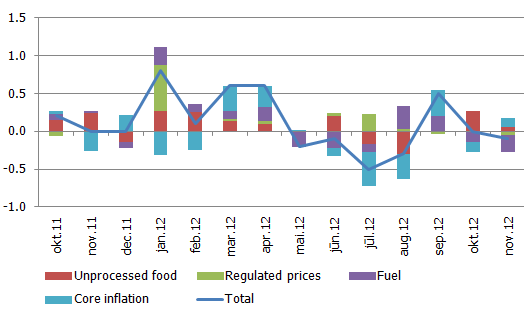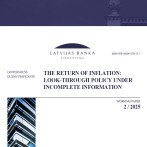Inflation low also in November
The annual inflation in Latvia in November remained as low as in October, at 1.6%. The consumer price average was brought slightly up by a rise in foodstuff prices, and lowered by the prices of fuel and thermal energy as well as unregulated services.
Figure 1. Contribution of main groups of goods and services to monthly inflation, in percentage points

Source: CSD, BoL calculations
The global food prices (except dairy products) show a slight downward trend, but the lagged impact of the high prices of grain continues to gradually make its way into the Latvian food market and is reflected in the prices of both unprocessed and processed food. In November, not only the prices of bread and other cereal products but also those of meat and dairy products rose, which can be explained, in part by an appreciation of cattle feed, yet in the groups of animal derived foods, the trend is opposite to global prices.
The stable global oil prices had a favourable effect on the prices of energy resources in Latvia, including both fuel prices and other, mostly administered prices. Under the impact of fuel prices, the monthly inflation dropped 0.22 percentage points (pp), and, under that of thermal energy prices, 0.05pp.
The annual core inflation remained at a low but positive level. Month-on-month the core inflation was brought down primarily by the changes in prices of communication services and services related to recreation and culture. The prices of processed food increased as mentioned before, yet it happened mostly as a result of a lagged (direct and indirect) impact of grain prices. This can thus be considered a supply-side-caused rise in prices that represents no threat to price stability in the middle or longer term.
In the coming months, the impact of administered prices will not grow substantially: neither the large gas and electrical power supply enterprises nor the water enterprises of the largest municipalities have submitted new tariff plans to the regulator. The plans submitted are mostly related to rises of per unit costs in water supply enterprises in small municipalities. The rises in per unit costs primarily are determined by the relatively small consumption. Consequently, no rise in inflation is expected in near future from this supply side either.
In November, the 12-month average inflation continued to drop reaching 2.5%, and this indicator matches of what was expected. The rate of salary rises at the moment is in step with productivity. Thus in the coming months no substantial inflation pressure on the consumer price level is expected from the labour market. If the prices of global resources remain stable, inflation in Latvia will remain at a persistently low level. The 12-month average inflation in December will thus not exceed the projected 2.4%, and could even drop a little more in 2013.
Textual error
«… …»






